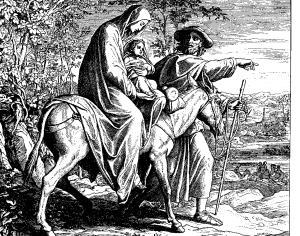Jesus has been on my mind of late.
In part I’m sure because of the holiday season. At the Unitarian Universalist church I served in Providence we had a tradition of a pick up Christmas pageant, boisterous, and with unitarian flourishes here and there, but basically following the conventional pattern. Makes sense as in New England Christmas is pretty much a Unitarian invention, the Puritan founders knew it was really a pagan holiday and had banned it. And it was the Unitarians who brought it back. At the church I’m serving as an interim with in Rancho Palos Verdes, there isn’t such a tradition. Speaking to the differences in regional styles in the UU world. Although we will be doing a conventional candles, carols, and readings service on Christmas Eve. Actually, I’m beginning to gather materials for that. So, like I said, Jesus is on my mind.
What directly triggered this small meditation was something a friend, both a Facebook “friend” and a real life one, posted, a quote from my favorite Jewish Buddhist song writer performer, Leonard Cohen from a 1988 interview.
I’m very fond of Jesus Christ. He may be the most beautiful guy who walked the face of this earth. Any guy who says ‘Blessed are the poor. Blessed are the meek’ has got to be a figure of unparalleled generosity and insight and madness… a man who declared himself to stand among the thieves, the prostitutes and the homeless. His position cannot be comprehended. It is an inhuman generosity. A generosity that would overthrow the world if it was embraced because nothing would weather that compassion. I’m not trying to alter the Jewish view of Jesus Christ. But to me, in spite of what I know about the history of legal Christianity, the figure of the man has touched me.
I find such resonance with this. It made me think of that famous Gandhi quote, “I like your Christ. I do not like your Christians.” Sadly, it appears to be one of those popular quotes that the person cited never actually said. Someone with a lot of patience has dug around and thinks it is a paraphrase of a line in Stanley Jones’ The Christ of the Indian Road, “I would suggest first of all that all of you Christians, missionaries and all begin to live more like Jesus Christ.” I find how widely quoted the line is, both by critics of Christianity and by Christians, when it has no obvious origin, is itself interesting. it points to something. And I find myself thinking about what that something might be.
While rummaging around the web I found some interesting commentaries on that alleged Gandhi quote, including a rather convoluted explanation of why Gandhi seemed to identify with the leper and the Samaritan when in fact he was the Pharisee. This small bit of weirdness is predicated on the assumptions of “conventional” Christianity that Gandhi probably shouldn’t have liked whether he said so, or not. In that Christianity the actions on behalf of the poor and the disenfranchised, all that attractive, and compelling, and frightening stuff that Leonard Cohen lists, well, it has nothing much to do with their religion.
Rather their religion is about the idea that Jesus is actually God who through Jesus sacrificed himself as atonement for the sins of humanity, and with that saving those who believe from eternal punishment and instead being born into an eternity of joy. What you do doesn’t matter, what you believe counts for everything. The shorthand for this religion is “Preaching Christ Crucified,” or, perhaps an “Easter Christianity.” As I think about it, I find that Easter Christianity a particularly unpleasant bit of nonsense, that would best be ignored, except for the power of the people who believe it, and the way they would treat those who don’t, given half a chance.
Everyone can cite scripture to prove their point, pretty much whatever that point might be. The canonical gospels paint four different kinds of Jesus. In Mark we get someone who might be a prophet in the sense of the older Hebrew scriptures, with a strange and haunting ending to the story. In Matthew we get a messiah, but again someone more aligned with the traditional Jewish understanding of messiah, although with a twist. A bringer of justice, although not as a king as was generally assumed to be coming, but as one of the poor. Luke adds in some hints of divinity into the narrative. But only in John, in all likelihood written three or four generations after Jesus died, is he a god in human skin. Without that fourth gospel it would be very hard to create an Easter Christianity.
 Among the Easter Christians they like to say you have to take it all together. Although when I do, I still don’t find their Christianity, a Christianity that turns from the teachings of Jesus right there in the texts as something to do right now and with great urgency, and instead toward a rather convoluted story about how to live forever, which is mostly a creation only tenuously connected to the scriptures. Instead, as I live into the stories of Jesus, his words and actions as contained in the scriptures I find Leonard Cohen’s Jesus, the strange, and wonderful, leaping out of the pages, breaking the chains of those who would make him some Greek mystery divinity. And instead, presenting something truly wonderful about what this world might be. “Any guy who says ‘Blessed are the poor. Blessed are the meek’ has got to be a figure of unparalleled generosity and insight and madness… a man who declared himself to stand among the thieves, the prostitutes and the homeless. His position cannot be comprehended. It is an inhuman generosity. A generosity that would overthrow the world if it was embraced because nothing would weather that compassion…”
Among the Easter Christians they like to say you have to take it all together. Although when I do, I still don’t find their Christianity, a Christianity that turns from the teachings of Jesus right there in the texts as something to do right now and with great urgency, and instead toward a rather convoluted story about how to live forever, which is mostly a creation only tenuously connected to the scriptures. Instead, as I live into the stories of Jesus, his words and actions as contained in the scriptures I find Leonard Cohen’s Jesus, the strange, and wonderful, leaping out of the pages, breaking the chains of those who would make him some Greek mystery divinity. And instead, presenting something truly wonderful about what this world might be. “Any guy who says ‘Blessed are the poor. Blessed are the meek’ has got to be a figure of unparalleled generosity and insight and madness… a man who declared himself to stand among the thieves, the prostitutes and the homeless. His position cannot be comprehended. It is an inhuman generosity. A generosity that would overthrow the world if it was embraced because nothing would weather that compassion…”
As we wind our way toward Christmas, I like to think it can be about that Jesus, not the Jesus Crucified and Resurrected, not the Easter Jesus, but the Christmas Jesus, the human Jesus, the good rabbi, who called us to a new world. His message was, best I can see, an apocalyptic call to reject greed, and hatred, and the illusion of separation. A bit crazy. A lot wonderful.
So, friends, in that spirit, let me be among the first to say Merry Christmas!













